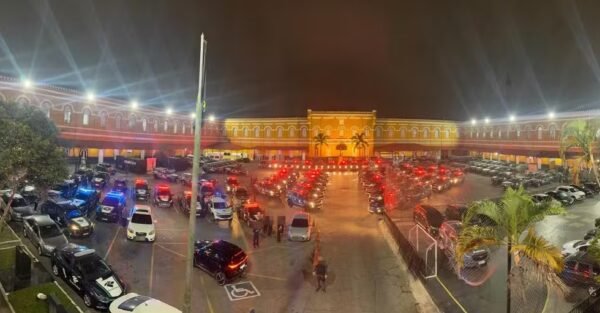A national task force of approximately 1,400 agents carried out search, seizure, and arrest warrants in eight states on Thursday (28/08) to dismantle a billion-dollar criminal scheme in the fuel sector, orchestrated by members of the First Capital Command (PCC) faction. The mega-operation, dubbed “Carbono Oculto” (Hidden Carbon), combined three investigations and unfolded in São Paulo, Espírito Santo, Goiás, Mato Grosso do Sul, Mato Grosso, Paraná, Rio de Janeiro, and Santa Catarina. According to São Paulo State Treasury officials, the group evaded more than R$7.6 billion in federal, state, and municipal taxes.
This Content Is Only For Subscribers
To unlock this content, subscribe to INTERLIRA Reports.
Various Stages
Irregularities were identified at different stages of Brazil’s fuel production and distribution chain. The scheme damaged not only consumers but also the broader economic sector linked to fuels. The PCC’s involvement included the illegal import of chemical products for fuel adulteration. Investigators uncovered more than 300 gas stations tied to the fraud, but the industry estimates the impact was far greater, reaching approximately 30% of all stations in São Paulo, or about 2,500 establishments.
Investment Funds
The Federal Revenue Service also identified at least 40 investment funds, with assets totaling R$30 billion, under the control of the PCC. According to the agency, the criminal network operated within São Paulo’s financial market, infiltrating Avenida Faria Lima. These funds were used to conceal assets, serving as structures for laundering the proceeds of the scheme.
How the Scheme Works
Investigators revealed that one of the main drivers of the fraud involved the irregular import of methanol. The product, which entered Brazil through the Port of Paranaguá (PR), was diverted from its stated recipients using falsified documents. It was then clandestinely transported to gas stations and distributors, where it was used to adulterate fuels. Consumers were deceived in two ways: either receiving less fuel than indicated on the pumps (quantitative fraud) or purchasing fuel adulterated with methanol that failed to meet the technical specifications required by the National Petroleum Agency (ANP) (qualitative fraud).
Billion-Dollar Criminal Fintechs
The group’s financial operations were routed through fintechs controlled by organized crime, whose client bases largely consisted of companies in the fuel industry, according to the Federal Revenue Service. At least 40 of these financial institutions were identified as key financiers of the scheme. With assets valued at R$30 billion, they facilitated the purchase of gas stations, trucks, ethanol plants, farms in São Paulo’s countryside, and luxury properties. Investigators stated that the use of payment institutions, rather than traditional banks, was intended to obscure financial tracking and hinder law enforcement efforts.
Analysis:
The “Carbono Oculto” operation illustrates how organized crime in Brazil has expanded beyond traditional illicit markets into complex economic sectors, exploiting regulatory gaps and weak enforcement mechanisms. The PCC’s infiltration of the fuel chain—spanning from chemical imports to retail distribution—demonstrates a level of sophistication that directly undermines both state revenues and consumer trust. By using fintechs and investment funds as laundering vehicles, the group blended criminal capital into legitimate financial markets, especially within São Paulo’s economic hub, creating significant challenges for oversight agencies.
From a security perspective, the case shows that organized crime is no longer confined to violent street-level activities but increasingly operates as a parallel corporate system with billion-dollar reach. For businesses in the fuel sector and beyond, this raises risks of unfair competition, reputational exposure, and regulatory backlash.




